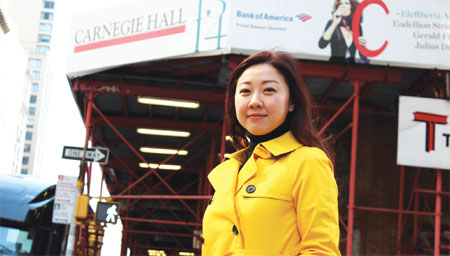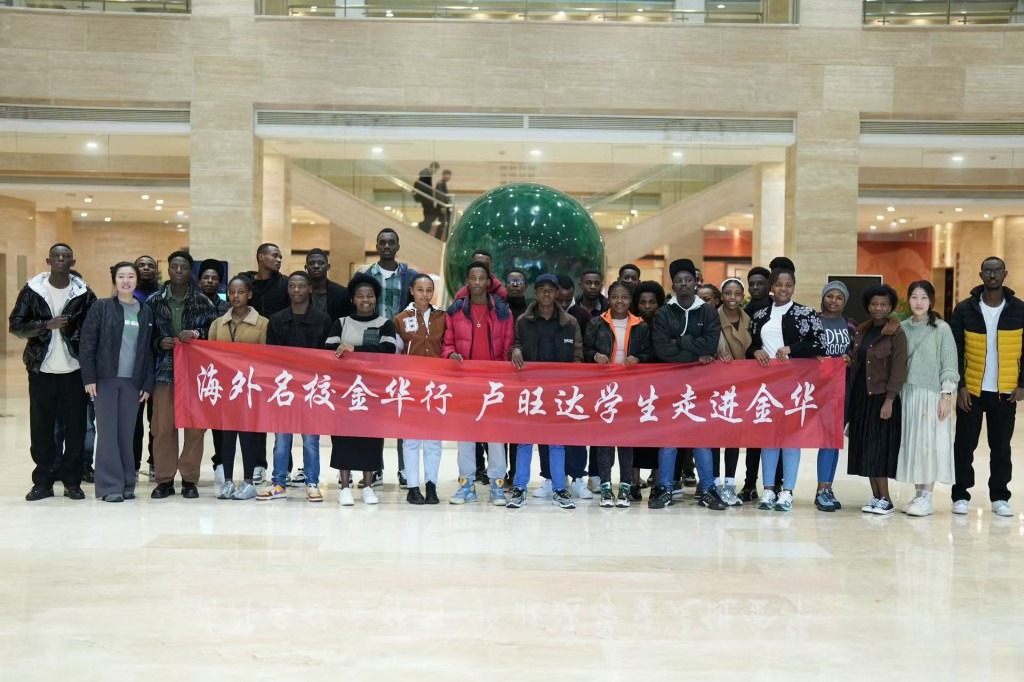A long musical journey to Carnegie Hall

| Hong Kong-raised cellist Clara Tsang in front of Carnegie Hall, where she performed pieces by Sergei Rachmaninov and Csar Franck on Tuesday. Tsang founded the Hong Kong Cellist Society in 2004. Amy He / China Daily |
For cellist Clara Tsang, the road to Carnegie Hall was paved with good intentions and many, many disappointments.
Hong Kong-raised Tsang played to an enthusiastic crowd at Weill Recital Hall at Carnegie Hall in New York on Tuesday, and the performance was an accumulation of decades of loneliness in her pursuit of music.
Tsang's cello performance of Sergei Rachmaninov's Vocalise, Op. 34, No. 14, Cello Sonata in G Minor, Op. 19, and Csar Franck's Cello Sonata marked her debut in the US, a country she hopes she can perform in again in the future, but she isn't going to think much about the future yet.
"I have no specific plans. I don't plan," she told China Daily. "Everyone thinks that I have all these plans, but that's not the case." Having no plan is the best plan, she said, because plans go awry all the time.
Born in Hubei province, Tsang moved to Hong Kong with her parents when she was young because of the opportunity for work. But growing up in Hong Kong was difficult because her parents didn't have any family or friends and lacked resources, she said.
Tsang didn't grow up with music; she fell into it accidentally. The first time she heard her elementary school teacher play the piano, she was entranced. When she asked for lessons, her teacher told her it would require money, money that Tsang's parents didn't have. She was told about instrument courses that the government funded, so she applied and tested, only to be told then that learning the piano was not an option.
After choosing the violin as an alternative, Tsang was told that the center where she was going to learn to play would close, and that if she wanted to learn an instrument at a different location, she would have to choose between the cello and the double bass. Tsang admitted that she chose the cello on whim - because it looked more elegant than the double bass - and thus her music journey began.
But resources were scarce and it took years before Tsang could finally learn how to play the cello. "I really wanted to learn music but there was nobody to take care of me," she said. "There was nobody to give me guidance."
When she finally was given the opportunity to properly learn, she had to play catch-up, practicing for hours every day, "using time to compensate," she said. Even then, she didn't have a method to her playing, having no foundation. But Tsang was serious about the craft and persisted, even in times of extreme hardship. A half year before she was admitted into a music college after high school, her mother was diagnosed with cancer, and her parents' relationship unraveled.
"At that age, I was so afraid. I felt apologetic to my mom because during that time I was preparing for music school and I had no time to take care of her," she said.
Music school itself was a struggle too. Growing up in a financially-strapped environment with parents who had no social circle and no spare time left Tsang unprepared to deal with all the social expectations of students her age, she said. She didn't have the money to eat out or go shopping with friends, so she funneled all her energy into studying and practicing the cello.
After she graduated from the Hong Kong Academy for Performing Arts with a degree in music, Tsang said she worked "feverishly. I worked so much I became numb." She taught classes, private lessons, freelanced with orchestras.
She decided she still wanted to pursue playing and was given the opportunity to meet with an acclaimed professor in Switzerland. But upon arriving, she was told that he may have taken her on as a student, but not at 27.
"He said that I couldn't have a career at that age," Tsang recalled. "I traveled all that way just to hear that. Music is so merciless."
Tsang had established the Hong Kong Cellist Society as a way of bringing people interested in classical music together. After the deeply disappointing meeting, she put her energy into organizing music events with the Society, which currently has more than 1,600 members, and encouraging people to perform, on top of her other jobs.
For years she juggled this part of her music life, but Tsang said she still wanted more - to just perform. So one day she went ahead and did it; she organized four concerts in 2013, which ultimately led her to Carnegie Hall.
An audience member at one of her Hong Kong concerts suggested that she try to play in the US. She was granted a fellowship by the Asian Cultural Council in New York and was invited to play at Carnegie.
"Everyone thought that maybe playing at Carnegie would be a huge pressure, but a week before that, I performed in Hong Kong in preparation for the New York concert," she said. "I played with the same mindset I did in Hong Kong as I did at Carnegie Hall, so it really doesn't matter where I play, I play just as hard everywhere."
(China Daily USA 03/21/2014 page2)
Today's Top News
- China's central bank outlines monetary priorities for 2025
- 8 killed, 15 injured in market fire in North China's Hebei
- IoT new engine of socioeconomic development
- Visit highlights strong ties with Africa
- Xi sends congratulations to new Georgian president
- No letup in battle against corruption































